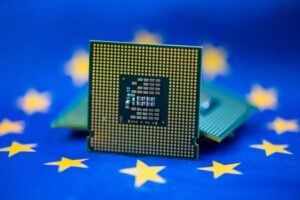
EDACafe Editorial Roberto Frazzoli
Roberto Frazzoli is a contributing editor to EDACafe. His interests as a technology journalist focus on the semiconductor ecosystem in all its aspects. Roberto started covering electronics in 1987. His weekly contribution to EDACafe started in early 2019. Nvidia abandons Arm deal; new Arm’s CEO; European Chips Act; Intel Foundry allianceFebruary 9th, 2022 by Roberto Frazzoli
In various ways, some recent governments’ decisions are contributing to shaping the future of the semiconductor industry. On the one hand, opposition from regulatory authorities around the world is forcing Nvidia to give up the acquisition of Arm; additionally – after the recent passing of the U.S. CHIPS Act – also the European Union is planning public financial support to new local fabs. The big picture includes Intel – also in the news this week for its foundry initiatives – that is likely set to benefit from public support for its future fabs. Nvidia gives up Arm acquisition; Arm to go public On February 7 Nvidia and SoftBank Group jointly announced the termination of the transaction whereby Nvidia would acquire Arm from SoftBank. As stated in a press release, the parties agreed to terminate the attempted deal because of “significant regulatory challenges preventing the consummation of the transaction”. In the same announcement, SoftBank also stated that Arm will now start preparations for a public offering within the fiscal year ending March 31. Some press and analysts’ comments are focusing on Arm’s ability to self-fund its growth through the stock market. EETimes recalls that – in a last attempt to rescue the deal – Arm released a document in January indicating it would face significant hurdles to growth as a standalone company if the acquisition fell through. Patrick Moorhead on Forbes, however, notes that for financial year ending March 31, 2022, Arm is forecasted to generate a record $2.5B revenue and $900M in adjusted EBITDA. According to Moorhead, this means that “Arm is actually very profitable” and this somewhat surprising revelation sheds new light on the IPO option.
Simon Segars steps down as Arm’s CEO, replaced by Rene Haas Hardly a coincidence, on February 8 Arm announced a CEO change: Simon Segars will be replaced by Rene Haas, effective immediately. Haas, who has served as president of the Arm IP Products Group since 2017, has also been appointed member of Arm’s board of directors. In the near-term Segars, who steps down after thirty years with the company, will support the leadership transition in an advisory role. The official announcement implicitly suggests that Segars stepped aside voluntarily and on friendly terms. EU Commission proposes additional investments to support chip manufacturing in Europe The European Commission, the cabinet government of the European Union, has proposed to the European Parliament the adoption of an investment plan to bolster Europe’s competitiveness and resilience in semiconductor technologies and applications. Called European Chips Act, the proposed plan builds on preexisting EU initiatives aimed at supporting semiconductor R&D, and is expected to mobilize more than €43 billion euros of public and private investments. The public investment includes € 11 billion to be directly provided by a new EU initiative (“Chips for Europe”) to finance technology leadership in research, design and manufacturing capacities up to 2030. The European Chips Act should spur the creation of new fabs or new production lines in the old continent, with the goal of doubling the European share of the overall global semiconductors production market – from less than 10% today to 20% in 2030 – and reducing Europe’s dependence on third-country suppliers. Benefits will be granted to facilities matching the definition of ‘Open EU foundries‘ (designing and producing components mainly for other industrial players) or ‘Integrated Production Facilities‘ (designing and producing components that serve their own market) provided they are “first of a kind” in Europe. As an exception to the rules against State aid, EU public funding support will be granted if the positive effects outweigh its potential negative impact on trade and competition. The proposed European Chips Act covers many aspects of the semiconductor ecosystem, including R&D, design, manufacturing capacity, supply chain, skill shortage, startup access to funding etc. If approved by the European Parliament, the plan will be adopted as a EU Regulation and will be directly applicable across the European Union. Semiconductor funding in 2021 Money from the U.S. CHIPS Act and the European Chips Act will add to the high funding level currently provided to the semiconductor industry by investors. According to market intelligence firm CB Insights, semiconductor companies raised over $16.5B across 852 deals in 2021, globally. Though this represents a slight decrease from the record level set in 2020, funding has still increased by 236% since 2019. Last year’s largest deals concerned two China-based startups, Jita Semiconductor and Chipone, that raised over $1B each. Intel launches its foundry alliance, supports Risc-V and chiplet-based innovation Every foundry has its alliance, and the recently established Intel Foundry Services (IFS) is no exception. Called Accelerator, the IFS ecosystem alliance currently includes seventeen founding partner companies. On the EDA front, the four large vendors are involved: Ansys, Cadence, Siemens EDA, Synopsys. As for IP, besides Cadence and Synopsys, members include Alphawave, Analog Bits, Andes, Arm, eMemory, M31, SiFive, Silicon Creations, Vidatronic. The Accelerator also includes three design service members: Capgemini, Tech Mahindra, and Wipro. The foundry ecosystem will be supported by a $1 billion fund to finance early-stage startups and established companies. The announcements emphasizes that IFS is the only foundry to offer IP for all three major ISAs (x86, Arm and Risc-V), pointing out that “Intel is planning investments and offerings that will strengthen the ecosystem and help drive further adoption of Risc-V”. Intel’s Risc-V ecosystem partners include Andes, Esperanto, SiFive and Ventana. Additionally, for its part, Intel is joining Risc-V International. Lastly, the company is also launching an open chiplet platform, co-developed with cloud service providers to accelerate the platform and package integration of customers’ accelerator IP. The initiative will leverage Intel’s packaging capabilities. Related to this, Intel is committed to partnering with other industry players to develop an open standard for a high speed die-to-die interconnect. |
|
|
|||||
|
|
|||||
|
|||||








